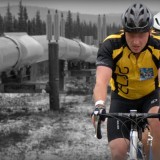The BC Cancer Foundation is ready for your concerns over accepting title sponsorship from controversial oil pipeline builder Enbridge for this year’s annual “Ride to Conquer Cancer” (make that the “Enbridge Ride to Conquer Cancer”). They even have a handy instruction sheet preparing their staff to deflect your tough questions and subdue your outrage. I should know – I helped draft it (well, sort of).
This past Thursday, reporter Stephen Hui published a leaked internal memo from the BC Cancer Foundation on The Georgia Straight’s blog. The document was a draft list of talking points (scroll down) formulated to deal with the building backlash over the fundraising partnership between the Foundation – which is the fundraising arm of the BC Cancer Agency (a provincial department) and not to be confused in any way with the Cancer Society – and Enbridge Inc.
I first wrote an exposé on the “Enbridge Ride to Conquer Cancer” in The Common Sense Canadian last November, titled “Oil, Cancer and Bicycles”.
Interestingly, a number of the sample questions listed in the memo – to which optimal answers are supplied – were copied and pasted directly from my list of emailed questions to the organization last Fall, while others are very similar. For instance (copied or similar phrases in bold):
- Their talking points question: “Are you concerned that Enbridge is using the BC Cancer Foundation to green wash or soften its public image in BC?”
- My original question to them: “[Are] you concerned that Enbridge is using the BC Cancer Foundation to greenwash or soften its public image in BC in light of all the controversy its proposed project has generated?”
- Their talking points question: “Given that the monies raised by the BC Cancer Foundation are going to a public body, the BC Cancer Agency, essentially Enbridge is providing funds to the provincial government, can you disclose the amount?”
- My question: “Given these monies raised by the BC Cancer Foundation are going to a public body, the BC Cancer Agency, I have to ask you the specific amount of Enbridge’s financial contribution to the Foundation with regards to this event.”
- Their talking points question: “How can you accept money from Enbridge, they are a cancer-causing organization? [It’s been proven that Benzene, found in petroleum products, is a carcinogen]. Would you accept money from a tobacco company?”
- My question: “Is it hypocritical to accept sponsorship from a known cancer-causing company?”
The “best practices” responses provided are a study in the corporate PR art of deflection. You can read them yourself here, but of note to me was the layered responses to the key question – namely, how can you take money for cancer research from a company whose products cause cancer? (I won’t go into that point in detail here – you can read the basis for this contention in my original article – suffice it to say there is considerable evidence that oil and its byproducts cause cancer at various stages of its life cycle). Here are the instructions from the memo – picked up after the initial response isn’t working:
[If pushed on the Benzene/cancer causing questions] I’m not an expert in environmental factors as they relate to cancer. What I can tell you is that the Ride raises more money than any other cancer fundraising event in Canada and these dollars are supporting research with direct impacts on cancer outcomes in this province and across our country.
[If pushed. Verbal answer only] Nationally, Enbridge is in a three year sponsorship agreement for the Ride, which is helping to invest more dollars from the event into critical, live-saving research. The BC Cancer Foundation collects event related feedback from our Ride participants and the public, which will help us to inform future plans and agreements.
In other words, whatever you do, DO NOT ACTUALLY ANSWER THAT QUESTION.
I had also asked the Foundation whether it felt it was “problematic to be associated with such an unpopular company and project in BC?” (i.e., the controversial proposed Northern Gateway pipeline). The talking points response: “Ride participation for 2012 is on track to set a new record with over 3,000 riders. This event is very personal to these individuals because they are survivors or are honouring loved ones who have been taken by Cancer.”
And yet, they’re clearly concerned enough to go to the trouble of formulating an internal strategy for dealing with Enbridge blow-back. To date, to my knowledge, only my original column, a subsequent excerpt published in Common Ground Magazine, and the aforementioned Georgia Straight blog have drawn attention in the media to this issue. But with the enormous media focus and public awareness the battle over Enbridge’s pipeline is generating as we speak, that may be about to change.
I suggest it is time for the BC Cancer Foundation to put those talking points to use. After all, practice makes perfect. It is time for the organization – linked through its sole client, the Cancer Agency, to the BC Government – to hear from the public about its deplorable choice to provide a very unhealthy company a platform to greenwash its image at such a pivotal moment in its campaign to build the Northern Gateway Pipeline.
So go ahead and phone in or email your questions and concerns – and watch for those copied and pasted talking points! (You may even try reading along with them when they go into a given script – I know that one, that’s talking point #8 – my favourite!)
Lest I be accused of being down on cancer research in general, I’ve done a little research of my own – into alternatives to the Enbridge Ride.
Readers who wish to continue supporting cancer research through a cycling activity may choose to divert their funds from the Enbridge Ride to Conquer Cancer to the “Ride2Survive” – described on the organization’s website as “a one-day cycling event from Kelowna to Delta BC to raise funds for cancer research through as an Independent Fundraising Event for the Canadian Cancer Society.” (emphasis mine) The organization also boasts that 100% of the funds raised from the ride go directly to cancer reserach, something few cancer reserach initiatives can claim.
And they don’t take money from Enbridge.



